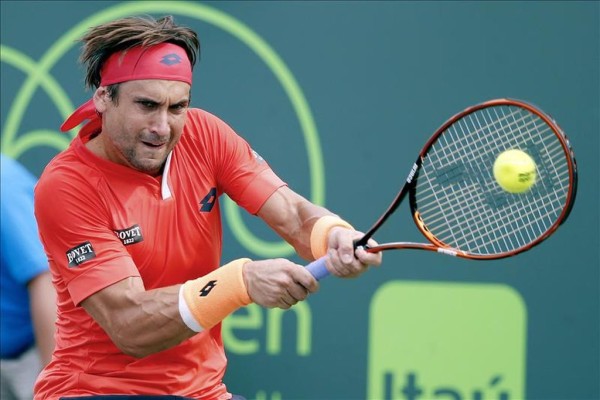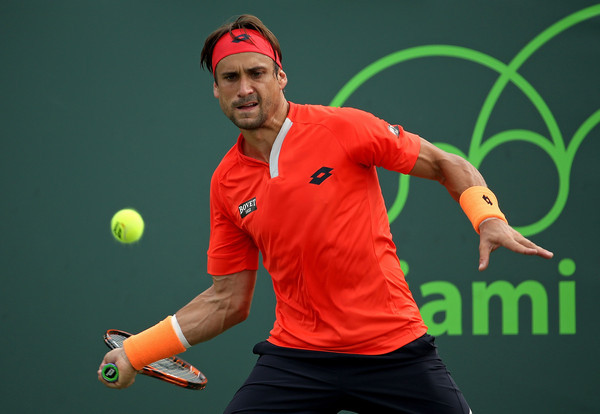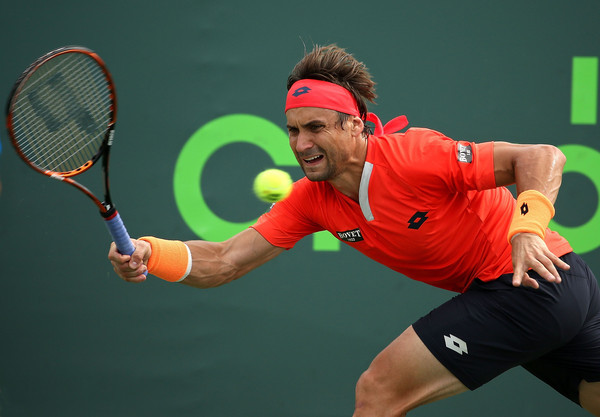
David Ferrer is easily playing some of his best tennis in years as he continues advancing forward at the 2015 Miami Open Masters after defeating Lukas Rosol in two sets.
Sixth seed David Ferrer advanced to his ninth Round of 16 in Miami after defeating No. 26 seed Lukas Rosol 6-4, 7-5 on Monday.
The Spaniard, who turns 33 years old on Thursday, saved six of seven break points faced in his 92-minute third-round victory at the Miami Open presented by Itaú. He will next face No. 12 seed Gilles Simon.
Ferrer is making his 13th appearance at this ATP World Tour Masters 1000 tournament, and has reached the semi-finals or better three times. His best showing was a runner-up finish in 2013 (l. to Murray).
With the win, Ferrer improved his FedEx ATP Head2Head series against Rosol to 4-0.
Frenchman Simon got the better of Alejandro Falla in their third-round match, beating the qualifier 6-3, 6-4.
The 30 year old converted on three of his four break point opportunities in the 82-minute match to reach the fourth round at this Masters 1000 tournament for the fifth time.
His best result in Miami was a quarter-final showing in 2011 and ’13 (l. to Federer and Haas, respectively).
If you happen to be a professional tennis player plying your trade at the same time as arguably the most dominant quartet in men’s history, you’re going to be overshadowed. But in the case of 32-year-old David Ferrer, the term takes on additional meaning.
Standing 5-foot-9, the unassuming Spaniard from Xábia – a small coastal town near Valencia – has frequently been the shortest member of the elite in men’s tennis, a sport where the ideal height is thought to be somewhere between 6-foot-1 (Roger Federer and Rafael Nadal) and 6-foot-3 (Andy Murray). Tellingly, World No. 1 Novak Djokovic splits the difference at 6-foot-2. Yet despite that, Ferrer, currently ranked seventh in the world, has flourished. He’s made a Grand Slam final, won 24 titles overall, contributed to three Davis Cup titles for his country and cashed prize-money checks that total nearly $26 million. He’s finished six seasons in the Top 10, and was once as high as Number 3 in the world.
That should clue you in to the fact that Ferrer is a phenomenally gifted player – there are no hacks in the Top 10, after all. But he wasn’t endowed with a huge serve or a forehand (or backhand, for that matter). Rather, his incredible talents reside in other, less appreciated facets of the game. Ferrer might end up being one of the great returners of serve in history: His career numbers for return games won (32 percent)stand toe-to-toe with those of Agassi, Djokovic, Murray and Nadal. Ferrer has also been gifted with incredible speed off the ground, and he’s not only fast: he can run forever and gift you very few free points, due to his remarkable consistency. That’s why he commands the respect of his peers, who know that they’ll be drawn into a war of attrition if they are to overcome the man whose friends lovingly call him “the Shark.”
The one time French Open runner-up has begun 2015 in spectacular fashion: his 20 wins and 2 losses this season have brought him three titles already (ATP 500s in Acapulco and Rio de Janeiro and an ATP 250 in Doha). Ferrer won his opening match on Saturday at the Miami Open presented by Itaú, a Masters 1000 event on the ATP World Tour, and before he took the court Monday against Lukas Rosol, he spoke to about the heights he’s already reached.
You made your first Masters 1000 semifinal at Miami in 2005, and again in 2006. Then there’s the 2013 final, which got away from you by mere millimeters. What is it about this tournament that inspires you to get such good results?
Well, Miami is always good, because there are many other Spanish people, many people who speak Spanish and it is very easy, it’s almost like being at home. I have such fond memories of Miami: my first Masters 1000 semifinal in 2005, and ever since I’ve had a good time here. I hope to play this event many more – well, not many more years, but a few more for sure.
20 wins, 2 losses and 3 titles in 2015 – how do you feel about your start to the season?
I am happy with how the year has started, and happy about my first match in Miami. After that, nothing, just rest and get ready for the next match. I think motivation, desire and tranquility are important. 2014 was a good year, I actually got a lot of points but there were also some anxiety. And this year, with my new coach Paco Fogués we’ve been focusing on maintaining that motivation for tennis.
2014 was a transition year for the tour, or so it seemed. Do you think that trend will continue in 2015?
Yes. This year there are very good players, you have [Nick] Kyrgios, [Bernard] Tomic, [Grigor] Dimitrov. [Kei] Nishikori is there, and he’ll likely consolidate himself near the top, [Thanasi] Kokkinakis, too. It’s very tough, no? It will be very hard to stay near the top of the rankings in the next two-or-three years, because a lot of good players are coming up.
You’re starting your 16th season as a professional. What has changed in tennis since you began your career back in 2000?
Well, now nobody has a bad shot. Everyone has a good backhand, a good forehand, a good serve. It’s much more of a power game, without as much of an intellectual component as before. Off the court, Nadal and Federer have marked an era. A very good period for the game, which has seen Nadal, Federer, Djokovic and Murray come up, each of whom would’ve been World Number Ones for a long period of time had they played in different eras.
Where do you think tennis is heading in the next 5-10 years?
I don’t know. I would guess that you will have to be at least between 5-foot-11 or 6-foot-3 to play tennis. I think players like me, around my height, are going to be extinct. People have evolved physically, and they hit the ball a lot harder than before.
Speaking of, is there a young player out there that reminds you of yourself?
Right now I can’t tell, since they’re all tall. But hey, they’re good. Strong players like Kyrgios, Tomic, Dimitrov. But if I’m honest, no, nobody reminds me of myself.
What element of your game has been the hardest to develop over the years? And what has come naturally to you?
Well, the mental aspect, of course. I have evolved a lot mentally. It’s hard to learn to have good routines and be consistent on a tennis court. Naturally? My timing, the fact that I can always hit the ball well. That was never a problem.
When you look at career return-of-serve numbers, you show up as one of the best not only in the present, but in history – at least since 1991, when the tour started keeping match stats. So in your opinion, who is best returner of serve of them all?
Well, I do not know because my career hasn’t overlapped with many great players who came before me. But in the last 15 years, I would have to say Novak Djokovic. He has everything: intuition, he’s very fast and he times the ball so well. The ball comes off his racquet with a lot of pace.
How have you developed your ability to return serve?
It’s harder now, without a doubt. Because people have bigger serves these days, the equipment has changed, so the ball flies faster than before. Since I’m not a great server, I felt like I had to compensate with my return. Ever since I was a kid I always tried to stand up there, close to the baseline to return serve. Which I still do to this day. You can always improve things. It is a matter of training. However, returning serve well depends a lot on intuition, which is something that’s not so easy to work with.
What are the two favorite moments of your career?
Well, my first French Open final, which I did not win, and the 2011 Davis Cup final in Seville, especially the match against Juan Martin del Potro.
What were the two most difficult moments in your career?
2008 was a difficult year. Because well, I had a few personal problems. And then at the end of that same year, in the Davis Cup final in Mar del Plata against Argentina, I played a match with David Nalbandian. It was a very complicated match, and I simply didn’t step up to the occasion. So even though Spain ended up winning the final, it was a tough time.
If you could travel back in time to when you started your career as a pro, what advice would you give to yourself?
I could change many things, given my experience and maturity now. Mostly I’d talk about staying calm and knowing how to face every match. But really, this scenario is not real – it’s impossible. And the difficult times I’ve had have unquestionably made me better as a player and as a person. If I’m honest with you, I wouldn’t change a single day of my life.




